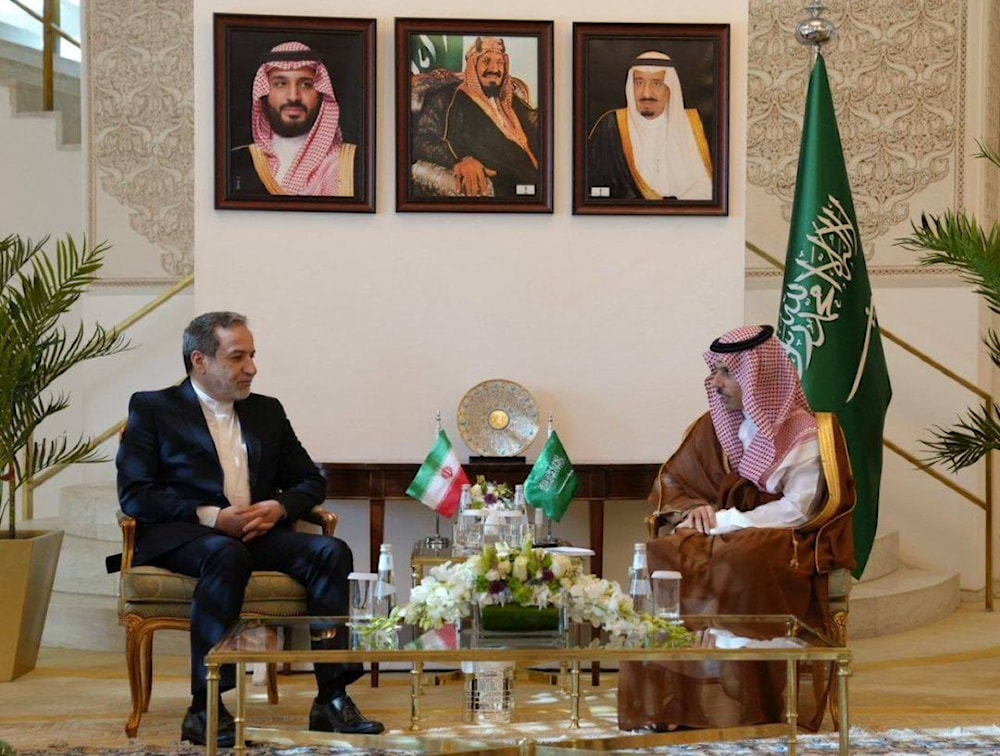Gaza broke down Israeli-Gulf ties; region approaches major shift: NYT
Saudi officials are distancing them from the Israeli government due to the war on Gaza, as their ties grow stronger with Iran.
-

Saudi Foreign Minister Faisal bin Farhan meets with his Iranian counterpart Abbas Araghchi, in Riyadh, Saudi Arabia, on October 9, 2024. (X/@araghchi)
Israeli policies and actions over the past year have prompted a significant shift in regional diplomacy, drawing Saudi Arabia closer to Iran, The New York Times (NYT) reported.
Frustrated by the lack of progress in normalization efforts with the Israeli regime, particularly due to its decisions that effectively block the establishment of a Palestinian state, Riyadh now views the prospect of finalizing a US-sponsored deal as increasingly bleak.
Washington has made serious efforts to promote a normalization deal between Tel Aviv and Riyadh, which it believed would reshape the Middle East. However, its performance during the Israeli war on Gaza has shown Saudi officials that the US holds no sway over "Israel".
Ali Shihabi, a Saudi businessman who is close to the monarchy and sits on the advisory board of Neom project, spoke to NYT, shedding light on Riyadh's positions.
He explained that previous normalization efforts, specifically the so-called "Abrahams Accords," were "cosmetic," however they did not present any substantive enduring peace agreement.
Shihabi underlined that some Arab governments agreed to the deals, as they saw through normalizing relations with "Israel as a path to influence in Washington."
"But now we see that the US has no power or influence over Israel — to a humiliating degree,” he underlined, adding that "the Israelis have no intention to create a Palestinian state."
Read more: Gulf states urge US to stop 'Israel' from attacking Iranian oil sites
Gaza set back any Israeli integration into the region
According to Shihabi's statements, Operation Al-Aqsa Flood and the ensuing events in Gaza, "set back any Israeli integration into the region."
As a result of continuous Israeli brutality and crimes against Palestinians, "Saudi Arabia sees that any association with Israel has become more toxic."
Nonetheless, Riyadh has kept the door open to normalization, if the deal secures the establishment of a Palestinian state that it sponsors, which Israelis "have refused," among other interests.
The United Arab Emirates, a leading normalizing state, has sustained relations with "Israel" over the past year, but these ties have recently experienced growing strain.
Last month, Emirati Foreign Minister Sheikh Abdullah bin Zayed stated that "the United Arab Emirates is not ready to support the day after the war in Gaza without the establishment of a Palestinian state," in response to "Israel’s" expectation that the UAE would contribute to Gaza’s reconstruction following the war.
Read more: Araghchi meets MBS, says Iran, Saudi can bring security to the region
Iran reshapes regional ties
Meanwhile, as the prospects of Netanyahu's new Middle East diminish, Iran has mobilized its diplomats in recent weeks, holding high-level talks with officials in the Gulf, Jordan, Egypt, and Turkey.
Following Iran's retaliatory strike against the Israeli regime, Tehran's Foreign Minister, Abbas Araghchi, visited Saudi Arabia, Iraq, Oman, Jordan, Egypt, and Turkey. The visit to Egypt marked the first in 12 years.
"In the region, we now have a common grievance about the threat of the war spreading, and the wars in Gaza and Lebanon and the displaced people," Araghchi underlined when he landed in Istanbul.
NYT says that images of Israeli war crimes coming out of Gaza, including "children buried alive under rubble, mothers grieving over their dead babies, and Palestinians starving because Israel had blocked aid," have all contributed to making it impossible for the Saudi leadership to ignore Palestinian statehood.
Although Iran's reproachment is fresh and in its early stages, Shihabi expressed that "as long as the Iranians are reaching a hand out to Riyadh, the Saudi leadership will take it."
Read more: 'Israel' expanded regional conflict for 'pre-existing plans': Al-Thani

 4 Min Read
4 Min Read








